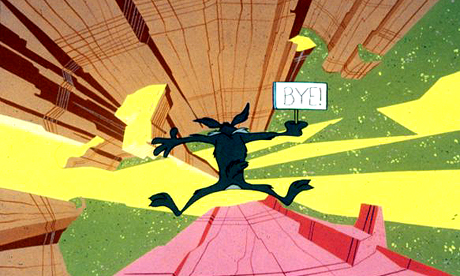Wait for the Splat. (We actually fell off the cliff) by Oliver DeMille
Published: Sat, 01/05/13
 "Empowering Ordinary Citizens to Make an Extraordinary Difference"
|
|
Wait for the Splat.
We actually fell off the fiscal cliff.
(and how a bigger fiscal cliff is coming in February 2013)
The raising of taxes is just beginning. The Fiscal Cliff agreement in Congress passed because the Obama Administration has mastered the technique of splitting the Republican Party through the use of crisis. Here's how it works.
"Governance via Crisis"First, the Administration looks for a
crisis or helps create one.
Second, it sits back and waits until the very last
minute. This is important because the air of crisis creates support for votes
that increase spending in the Administration's proposals.
Third, the Administration mixes some good things that really
are needed to avert the crisis right along with increased spending schemes of
various sorts.
Since time is short and a crisis is imminent, the media tends to
couch the situation in three ways:
The Obama team used this same scheme in the Debt Ceiling
negotiations in 2011, the Government Shut-Down crisis of April 2011, and the Fiscal
Cliff debates in 2012/2013.
In all three cases, many Republicans felt the
pressure of crisis and voted with the Democrats, thus bringing President Obama
his victories. He's three-for-three when he uses this technique.
In the Fiscal Cliff situation, Republican "cooperation" brought almost no spending cuts and added nearly $4 trillion to the $15.5 trillion national debt. Note that when President Obama came into office, the debt
was under $10 trillion.
Under his watch, it increased 54% in the first three
years, and with the costs of the Fiscal Cliff agreement added it is now just
under $20 trillion.
It will grow much more when Obamacare gets fully
implemented. Plus, the payroll taxes just went up.
New to the Poli-Sci Lexicon
As I wrote in an earlier article, we are now a Spendocracy rather than a Republic, and our political decisions are based more on Crisisocracy than Democracy. But this growth of government spending is just beginning--if the Obama team gets its way. The Administration will likely use this same crisis technique again in the Debt Ceiling debates of February 2013. After all, this technique is extremely effective. The only way to overcome this is for Republicans in the
House of Representatives to simply vote against such proposals.
Just say no.
Let
the crisis come. Let at least one of these crises come. Call the President's
bluff.
This isn't an extreme or populist view. It's actually the
moderate, balanced approach.
Think about it. If Republicans had refused to give
into this tactic in 2011 and just let the government shut down for a few days,
it wouldn't have come up in the debt ceiling debate.
If they had allowed the
debt ceiling to be raised later in 2011, the Obama team wouldn't have dared try
this method on the Fiscal Cliff.
If Republicans had stood firm and voted down
the Fiscal Cliff deal, the White House could not use this type of negotiation
in the February 2013 debt ceiling debate.
"But we would have drastically hurt the economy," the
critics respond.
This is exactly wrong.
It's correct in the short term, but
in the long term the opposite is actually true.
Let's be clear: If Republicans
vote down the Obama proposal in one of these big crises, it will certainly have
a negative short-term impact on the economy.
But the negatives aren't nearly as
big as those caused by voting for these proposals and continuing to increase
our federal spending, national debts and government deficits.
No Extra Credit
Specifically, world credit agencies are watching, and every
time we refuse to stop spending and instead cave in and keep increasing our
debts, our credit rating is weakened.
If we keep on this path, further
downgrades are inevitable. In fact, the day after the Fiscal Cliff law passed
Congress, Moody's said that since the law increased the deficit, a further
downgrade of U.S. credit is likely.
Moody's also said that the Fiscal Cliff law
will cost America over 600,000 jobs.
The same thing applies to the U.S. Dollar as the world's
reserve currency. Many nations (led by China and supported by several leading
European countries) are currently pushing to end the dollar's status as the
global reserve currency, and the Fiscal Cliff vote greatly weakened America's credibility
in this issue.
The importance of this is hard to overstate.
Remember that when
Great Britain lost their benefit of holding the world's reserve currency in the
1970s, the net worth of most British citizens decreased more than 25-30
percent.
No matter how badly the economy might respond to going off the fiscal cliff, closing the government, or not raising the debt ceiling, it would not approach anything near 25%. A further credit downgrade or loss of the reserve currency
status would be much, much worse than just letting one of these minor crises
happen.
That's what many people don't quite understand, and what House
Republicans need to clarify.
Take Your Medicine
America needs the House Republicans and Democrats to tell
the Obama Administration that we'd rather face a recession now than a depression
in the coming years.
We need the House to take a stand, to demand spending cuts
or shut down the non-essential portions of government until the Senate and
President cave in, to negotiate from a position of strength.
A recession is painful. But getting out of it typically
takes 1-2 years. A depression, in contrast, takes 5-15 years to overcome--and the
pain is much deeper and more widespread.
If we continue to increase spending in
Washington and raise taxes on business creators, more capital and jobs will
continue to leave the United States and we will move even closer to a depression.
This is precisely why depressions happen, because nations
find it difficult to make hard decisions when the stakes are high, and as a
result they don't do the hard things that would fix the economy--until it is too
late.
If Republicans fail once again to stop the spending during the Debt Ceiling
vote this February, the economy is poised for major downturns.
Make no mistake. Whatever the pundits say, we fell off the
fiscal cliff on January 1, 2012.
Until House Republicans stand up and simply
say "no" to the Obama super-spending agenda, the Spendocracy will grow and a
depression is looming. Indeed, conspiracy theories aside, those who want
government to grow are actually benefited by recession and depression because
they gain even more demand for increased government involvement.
Follow the Money
When governments
increase spending and regulation on a struggling economy, downturn follows.
In
economic recessions, central governments grow. In depressions, they triple or
even quadruple in size.
In short,
depressions are a big-spender's dream, so don't expect the White House or
Senate to do very much to stop our current financial problems.
Right now our only chance to head off a real crisis is for a
lot more courageous "no" votes by members of the House.
*******************  Oliver DeMille is the co-founder of the Center for Social Leadership, and a co-creator of TJEd. Oliver DeMille is the co-founder of the Center for Social Leadership, and a co-creator of TJEd.He is the author of A Thomas Jefferson Education: Teaching a Generation of Leaders for the 21st Century, The Coming Aristocracy: Education & the Future of Freedom, and FreedomShift: 3 Choices to Reclaim America's Destiny.
Oliver is dedicated to promoting freedom through leadership education. He and his wife Rachel are raising their eight children in Cedar City, Utah.
Connect With Oliver: |
Connect & Engage
Recent Blog Articles
By Stephen Palmer
By Oliver DeMille
By Bryan Hyde
By Oliver DeMille By Chris Brady
By Stephen Palmer Free PDF Downloads
|
www.TheSocialLeader.com |




